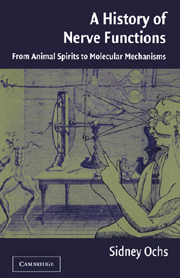Book contents
- Frontmatter
- Contents
- Preface
- 1 Introduction: Greek Science and the Recognition of Nerve as a Channel
- 2 Galen's Physiology of the Nervous System
- 3 Nerve, Brain, and Soul in the Middle Ages
- 4 Renaissance and the New Physiology
- 5 New Physical and Chemical Models of Nerve in the Enlightenment
- 6 New Systematizations of Nerve Function in the Enlightenment
- 7 Electricity as the Agent of Nerve Action
- 8 Nerve Fiber Form and Transformation
- 9 Wallerian Degeneration: Early and Late Phases
- 10 Nerve Regeneration
- 11 Characterization of Axoplasmic Transport
- 12 Molecular Models of Transport
- 13 Actions of Neurotoxins and Neuropathic Changes Related to Transport
- 14 Purposeful Reflexes and Instinctive Behavior
- 15 Neural Events Related to Learning and Memory
- 16 Epilogue: With Observations on the Relation of the Nervous System to Mind
- Bibliography
- Index
2 - Galen's Physiology of the Nervous System
Published online by Cambridge University Press: 13 August 2009
- Frontmatter
- Contents
- Preface
- 1 Introduction: Greek Science and the Recognition of Nerve as a Channel
- 2 Galen's Physiology of the Nervous System
- 3 Nerve, Brain, and Soul in the Middle Ages
- 4 Renaissance and the New Physiology
- 5 New Physical and Chemical Models of Nerve in the Enlightenment
- 6 New Systematizations of Nerve Function in the Enlightenment
- 7 Electricity as the Agent of Nerve Action
- 8 Nerve Fiber Form and Transformation
- 9 Wallerian Degeneration: Early and Late Phases
- 10 Nerve Regeneration
- 11 Characterization of Axoplasmic Transport
- 12 Molecular Models of Transport
- 13 Actions of Neurotoxins and Neuropathic Changes Related to Transport
- 14 Purposeful Reflexes and Instinctive Behavior
- 15 Neural Events Related to Learning and Memory
- 16 Epilogue: With Observations on the Relation of the Nervous System to Mind
- Bibliography
- Index
Summary
After the contributions of the Alexandrians Herophilus and Erasistratus in the fourth and third centuries b.c. (Chapter 1), the next great advance in anatomy and experimental physiology of the nervous system was made in the second century a.d. by Galen of Pergamon (c. 129–216). His extensive writings on medical practice, science, logic, philosophy, and his studies of anatomy and animal experimentation, a large portion of that work on the nervous system, made him a towering figure in the history of medicine. He was likened in importance to Hippocrates, with his influence extending into the nineteenth century. In addition to a fairly large part of his writings on the anatomy and physiology of the nervous system, his discussion of significant portions of the writing of his predecessors, of Erasistratus and others on the nervous system, has preserved what would otherwise be lost to us.
GALENIC PHYSICS IN RELATION TO HIS PHYSIOLOGICAL THEORY
In his physical science, Galen accepted the Pythagorian-Empedoclean-Platonic accounts that matter is composed of four elements; fire, water, air, and earth with their qualities of hot, moist, cold, and dry, respectively (Chapter 1). The elements do not exist as such in the body, but are characterized as blood, yellow bile, black bile and phlegm. His humoral theory was based on the theory of Hippocrates and Aristotle, in which blood is believed to contain the “hot and moist,” yellow bile the “hot and dry,” black bile the “dry and cold,” and phlegm the “moist and cold.”
Information
- Type
- Chapter
- Information
- A History of Nerve FunctionsFrom Animal Spirits to Molecular Mechanisms, pp. 24 - 35Publisher: Cambridge University PressPrint publication year: 2004
